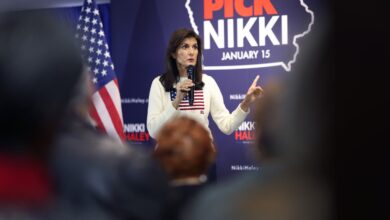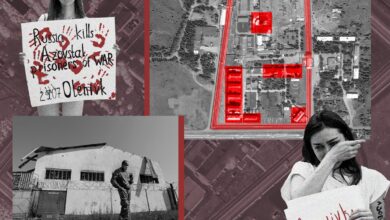‘No journalist knows if they will live until the evening’: The reporters risking their lives to cover the Israel-Hamas war

Wearing their press jackets, a group of journalists sat together as they sang a haunting melody: “We will remain here in our homes, until the pain goes away.”
Sitting among the circle of Palestinians was Wael Al-Dahdouh, an Al-Jazeera correspondent all too familiar with pain and loss. The world watched as he learned his wife, son, daughter and grandson had been killed in an Israeli air strike on 25 October.
Just two months later, Mr Al-Dahdouh was hit by shrapnel while he was reporting from the scene of a bombarded school in Khan Younis. Weeks later, his other son Hamza- also a journalist- was killed in an air strike by Israeli forces.
The same circle who sang together gathered around Mr Al-Dahdouh as he buried his son, with one hand gripping a press helmet. Despite his unimaginable losses, he continued reporting and said: “All the world needs to see what is happening here.”
As Sunday marks the 100th day of the war, data from the Committee to Protect Journalists (CPJ) shows more journalists were killed in the first 10 weeks of the Israel-Gaza war than have ever been killed in a single country over an entire year.
CPJ places the death toll at at least 82; 75 Palestinian, four Israeli, and three Lebanese. The four Israeli journalists were killed in the 7 October Hamas attacks that left more than 1,200 people dead. Among them was Yaniv Zohar, a former Associated Press videojournalist who was killed along with his wife and two daughters.
The International Criminal Court (ICC) has announced it is investigating alleged offences against Palestinian journalists since the Hamas attacks, after Paris-based NGO Reporters Without Borders (RSF) filed a second complaint in December. RSF described the targeting of journalists as “intentional homicides of civilians”.
The United Nations said Gaza has seemingly become the deadliest place for journalists and their families in the world, as it raised concerns again following the killings of Hamza Dahdouh and Mustafa Thuraya, a freelance videographer working for Agence France-Presse.
“Very concerned by high death toll of media workers in Gaza,” the UN rights office wrote on X, adding: “Killings of all journalists, including Hamza Wael Dahdouh and Mustafa Abu Thuria in reported IDF strike on car must be thoroughly, independently investigated to ensure strict compliance with international law, and violations prosecuted.”
Efforts to document the war are already hindered by frequent communication blackouts and the refusal for journalists to rotate in or out of the Gaza Strip. Only a handful of international journalists have been permitted to enter Gaza with Israeli troops.
Speaking from Al-Aqsa hospital in Deir al-Balah, reporter Motee’ Masbah told The Independent: “No journalist here knows if they will live until the evening.”
“We are under deliberate and intentional targeting by the occupation,” he claimed. “Israel wants to stop the Palestinian people from learning what is happening on the ground. It is blatant.”
Israel has denied targeting journalists and says it does everything it can to avoid harming civilians in its war on Hamas.
Following the strike on Hamza Dahdouh and Mustafa Abu Thuria, Israel initially claimed its forces had “identified and struck a terrorist who operated an aircraft that posed a threat to IDF troops”.
“We are aware of the reports that during the strike, two other suspects who were in the same vehicle as the terrorist were also hit,” it added. However, the Israeli military’s chief spokesman appeared to contradict this statement when he was asked by NBC to provide evidence to support the claims, as he responded: “We understand they were putting a drone, using a drone. And using a drone in a war zone, it’s a problem. It looks like the terrorists.”
Reuters’ journalist Issam Abdallah was killed while stationed roughly one kilometre from the northern Israeli border with Lebanon on 13 October
He added that the incident would be investigated. The families of the journalists strongly refuted the claims as Mr Al-Dahdouh’s family told the BBC they were “fabrications” made to justify the targeting of journalists.
Ramy Abdu, the founder of Euromed Monitor, paid tribute to Bilal Jadallah, the director of Press House-Palestine, who was killed when an air strike hit his car on 19 November. His most recent work documented a deadly pattern of journalist killings by Israel Defence Forces for CPJ.
“No foreign press got into Gaza without Bilal’s help,” Mr Abdu said. “But he was killed without any word of condemnation from Europe. They forgot about him.”
Journalists documenting developments in the West Bank say they have also found themselves under threat while doing their job. Asif Nawfal, 28, described dodging bullets as he and other journalists tried to cover settler attacks on the village of Deir Sharaf, west of Nablus, on 2 November.
Motee’ Masbhah says he feels obliged to continue reporting despite the danger posed
Abeer, center, sister of Reuters videographer Mr Abdallah, weeps at his funeral





